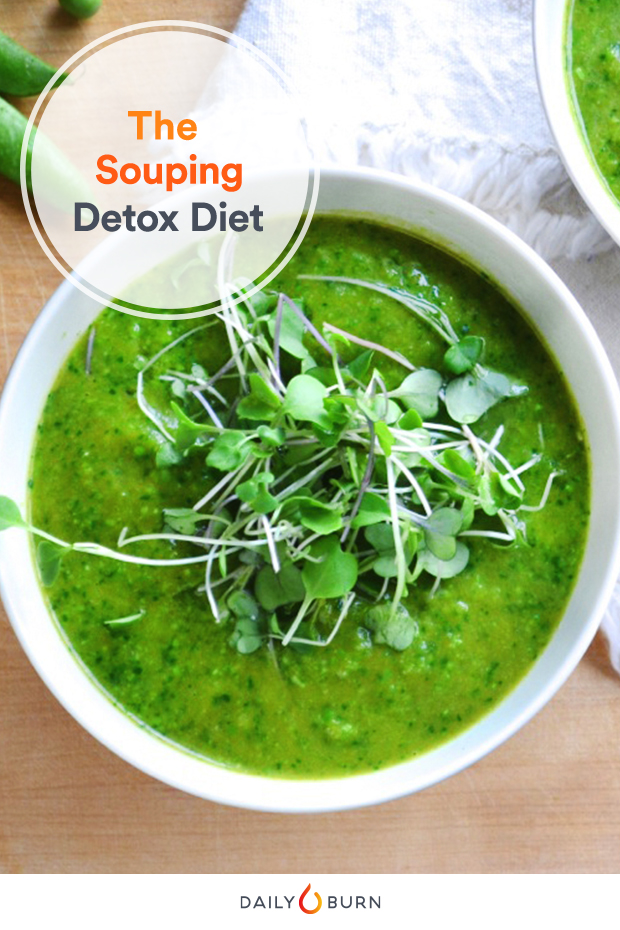
Maybe you need to include more veggies in your diet. Or maybe you overindulged over the weekend and are in desperate need of a detox. But don’t subscribe for another round of a juice cleanse or teatox just yet (catch the scoop on those here). There’s a hot new sip in town — soup.
The traditional cozy comfort food and cold cure-all has moved into the wellness spotlight as the latest weight loss and detox darling. “It’s juicing to the next level. You rely on soup as your meals for the day,” says Jessica Fishman Levinson, RDN and culinary nutrition expert.
Ready to swap your straw for a spoon? Here’s what you need to know about souping.
RELATED: Detoxing for Beach Season? Here’s Your 5-Day Plan
What’s Healthier: Souping or Juicing?
While souping uses some of the same fresh ingredients you’ll find in your favorite juices, there’s one major difference — fiber. Instead of extruding fruit and vegetables through a press (and removing the fiber along the way), soup typically consists of pureed whole foods.
“One of the downsides of juicing is it can be high in sugar.”
These superfood-packed soups often include more than just fruits and vegetables, too. “With souping, you’re getting more fiber because the soups can have beans and grains in them. They can have protein. You’re not just getting liquid calories,” says Levinson. According to Kate Geagan, RD and author of Go Green Get Lean, that extra fiber can slow digestion and absorption, which may fight hunger longer than a juice. Think of it as a souped-up smoothie for breakfast, lunch and dinner.
RELATED: How to Do a Sugar Detox (Without Going Crazy)
“[Souping] is also a tasty, convenient, readily-approachable way to include many of the foods we know we should be eating more of — but that we struggle with, like vegetables, fruit and legumes,” Geagan says. The wider range of ingredients also means less sugar. “One of the downsides of juicing is it can be high in sugar. Even if it’s natural sugar, it can make your blood sugar go up quickly,” says Levinson. “Souping can be lower in sugar [than juicing] because of the other foods.” Plus, there are some ingredients, like tomatoes, where the nutrients are more accessible when cooked. “Let’s say you had a tomato-based soup. You can get the lypocene from the tomato more efficiently than from raw tomato juice,” says Levinson.
And, souping up may help you avoid the hangry rants commonly associated with juice cleanses. “People get it that they should have more in their diet than just juice but they still want something that’s quick and easy,” says Levinson. “Soup can be filling if it has the right components.”
RELATED: The Science Behind Why You’re Hangry
A Better Way to Detox?
But does the higher fiber and lower sugar mean that souping is the better way to detox?
“A single drink, juice or soup isn’t going to ‘detox’ you any more than a single unhealthy meal is going to make you gain weight. It’s the daily choices that really add-up,” says Geagan. “Supporting your body’s best chemistry is an ongoing process of good nutrition, sleep, hydration and exercise. The liver is the human body’s great detoxification organ, and good nutrition supports the liver and helps it function at its best.”
Despite the benefits souping offers over juicing, Levinson is also weary of recommending it as a sole diet plan or weight loss tool. “Anytime you’re on a lower calorie diet, you’ll lose weight,” she says. And from the ones the RD has seen, souping plans run approximately 1,200 calories a day. “That’s really not enough for most people. And it’s not sustainable because you have the deprivation factor,” she says.
RELATED: 12 Things Nobody Told Me About Losing Weight
Plus, you lose some of the joy of food when you sip a soup. “It’s not like sitting down to a plate of salmon and sweet potatoes and broccoli where you taste the different flavors and you feel the different textures of food on your tongue,” says Levinson. “There’s a psychological benefit to using all of your senses when you eat and you can lose that when you’re just drinking.” While a hot soup might slow you down a beat, a liquid diet still tends to go down faster. “You’re not being as mindful when you’re eating and drinking your soup quickly,” she says.
While souping may be a step up from juicing, you still want to proceed with caution. It can be a good addition to your meal plan (especially if you’re looking for a convenient and portable way to down your veggies), but you may want to rethink a diet based only on soup. “I think it’s another one of those trends that’s hot right now and going to phase out,” says Levinson.
